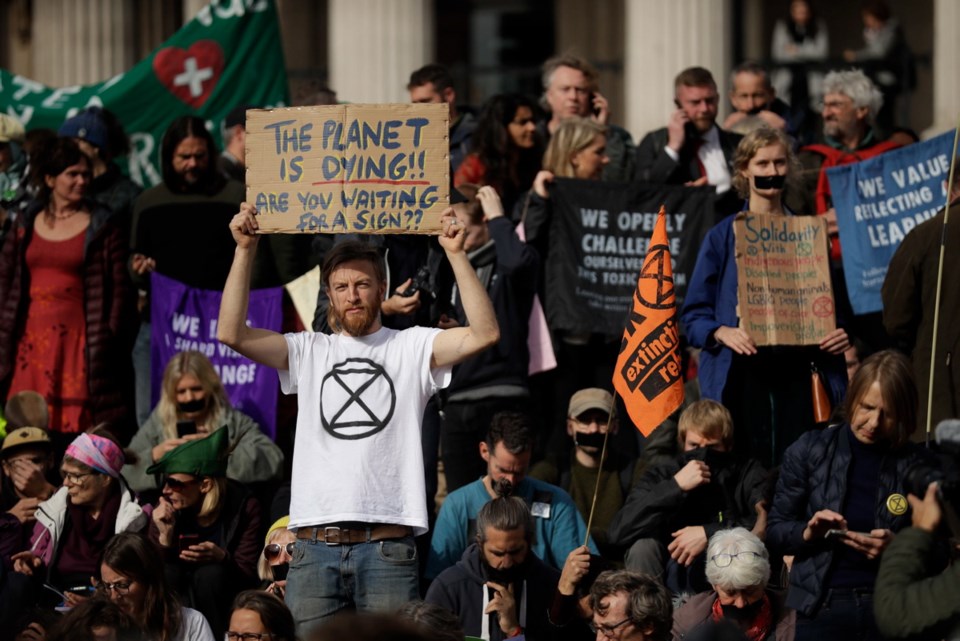The protest signs at the Climate Strike on Sept. 27 were blunt, compelling and sometimes entertaining (my favourite was “Not Usually a Sign Guy — But Jeez”). There was an edge of desperation that took me back to last summer, when Greater Victoria was shrouded in smoke and climate chaos became a local issue we couldn’t ignore.
I wrote then that we need language that communicates the severity of what we face. If we called it the “oven effect” instead of the “greenhouse effect,” or “global overheating” instead of “global warming” or “climate chaos” rather than “climate change,” we’d be better motivated to make changes. Instead, insipid language contributes to insipid results.
I recently read a comparison of the decisive action taken in the 1980s and 1990s to prohibit substances that eat away at the ozone against today’s tepid efforts to slow climate change. The “ozone hole” captured our attention. Would we have taken the same action for the “ozone effect” or “ozone change?”
Here’s another change in language we need. The word “growth” has been the unassailable mantra of the economy and business for decades. Growth is good; no growth is bad. End of story.
However, pursuing growth for its own sake needs a rethink.
In developed countries such as Canada, it’s time to declare victory. We won. Our economy is all grown up. We’re maybe even overgrown if you look at full employment, rocketing housing prices, ballooning stock markets and an overheated climate. (As another sign said: “There Is No Planet B.”)
Coming to terms with a new way of thinking about economic health doesn’t mean we need to grind to a halt. That won’t get us anywhere.
Once again, language is key. What if we replaced the mantra of “growth” with language that better explains where we want to go? Such as “economic improvement.”
Isn’t that what we really mean by growth anyway? Growth doesn’t mean we want to keep increasing the amount of paved land so we can drive and park more cars. We want improvement that reduces congestion and emissions by making it easier for all of us to choose electric vehicles, public transit and active transportation.
We don’t want to grow our housing supply by cutting down forests. We want to improve building design and technology and materials, so we have well-insulated homes with a more practical footprint.
We don’t want to grow our supply of food by flying it in from factories on the other side of the planet. We want to buy locally produced food that is more effective at keeping us healthy.
Job growth does not mean we need more coal miners, parking-meter readers or oilsands workers. But there is demand for recycled-material experts, solar-energy techs and life scientists.
“Improvement” is a sweeping and subjective term — as is “growth.” But it shifts the focus from “what gets us more” to “what makes things better.”
We can’t forget that growth was also a new idea once. Born from the Industrial Revolution, the concept was put on steroids after the Second World War. Since then, driven by the energy provided by fossil fuels, growth has taken the world by storm.
But, starting in the 1980s with the work of the Brundtland Commission, an effort took root to pursue sustainable development on a global scale.
Sustainability is also a big idea with subjective meaning, but it hasn’t succeeded in becoming a new mantra of business. Maybe it stalled because “sustainability” sounds like a state of suspension or stagnation. It doesn’t sound like dynamic, creative change.
We need a new approach that values and rewards human ingenuity, technological advancement and business innovation.
People want to make things and do things that help people and the planet, and to earn a living. The world desperately needs more of that to happen.
A recent issue of a leading Canadian business magazine featured “Canada’s Top 400 Growing Companies.” What if we ranked “Canada’s Top 400 Companies Improving the Economy?” And, at the top of the lists of improvements, let’s recognize companies reducing gases that heat our atmosphere.
The idea behind carbon taxes and carbon credits is to change how we count what contributes to our economy and what detracts from it. Carbon removal and reduction becomes valuable and carbon creation is costly. This is now part of our economy and has improved how we manage our resources.
Let’s extend that idea and figure out how to measure and reward all kinds of economic improvement.
What gets measured and valued in the current definition of growth doesn’t tell the story we want. We count forestry revenue, but not forests; fisheries harvests, but not fish; crops produced, but not soil conditions; fruit, but not bees.
Earth’s physical resources have limitations — but there is no limit to human ingenuity, creativity and invention. It’s time to talk about what we really want from our economy.
Catherine Holt is the CEO of the Greater Victoria Chamber of Commerce.



